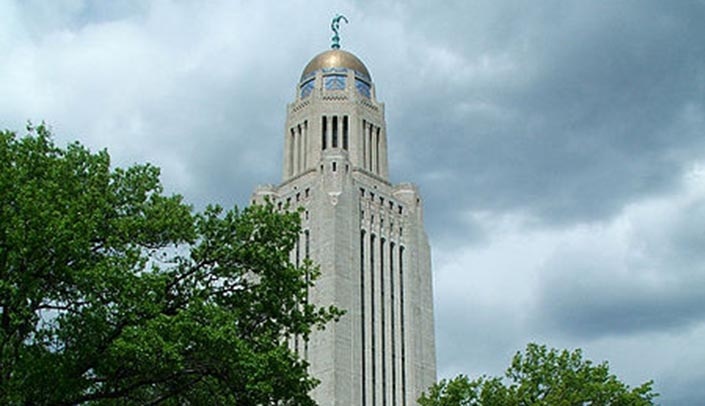Leaders from UNMC and the University of Nebraska at Kearney spoke before the Nebraska Legislature’s Health & Human Services Committee on Oct. 3 to provide information in response to Legislative Resolution 139, in which the committee explored the feasibility of increasing the presence of UNMC in central and western Nebraska by strengthening and creating new collaborations with the University of Nebraska at Kearney.
Kyle Meyer, Ph.D., dean of the UNMC College of Allied Health Professions, Julie Sebastian, Ph.D., dean of the UNMC College of Nursing, Jeff Harrison, M.D., UNMC College of Medicine, Nicole Carritt, director of rural health initiatives, and Tina Chasek, director of the Behavioral Health Education Center of Nebraska-Kearney, spoke on the resolution introduced by State Sen. John Lowe. UNK’s Charles Bicak, Ph.D., and Peggy Abels also addressed the committee.
The study aimed to:
- Identify priority health professions that are experiencing extreme shortages;
- explore current training programs and their sustainability;
- discuss the current preceptorship pool available to provide clinical training to students;
- discuss technology to assist in the provision of education and care delivery opportunities;
- examine the importance of public-private partnerships in providing education and care delivery opportunities; and
- recommend potential strategies and funding sources to achieve priority opportunities.
Recommendations made by the University of Nebraska team included:
- Expanding and enhancing existing rural health profession training pathway programs to encourage and support Nebraska students to enter the health professions and practice in rural areas of the state.
- Enhancing the availability of scholarships for health profession students at all levels interested in serving in rural underserved areas of Nebraska to assist students with unmet financial needs and encouraging students to remain in the state after completion of their training programs.
- Developing tax incentive strategies for clinical education preceptors to help offset the financial burden preceptors or clinical agencies may experience when supporting community-based student teaching and residency training.
- Developing new medicine residency and fellowship programs through public-private partnerships that meet the need for increased numbers of trainees, allowing them to stay in Nebraska for training and therefore increasing the likelihood they will stay in Nebraska to practice.
- Expand and enhance programming to support degree advancement options, which allow existing health care professionals serving in rural Nebraska to advance their degrees without leaving the workforce.
- Add new certificate or degree options for health profession students that meet emerging needs in the clinical environment.
“We appreciated the opportunity to share with members of the committee how UNMC and the University of Nebraska at Kearney are currently collaborating and how we can continue to build on that successful partnership to address healthcare workforce needs and increase access to health care in central and western Nebraska,” Carritt said. “Should the resources become available to accommodate the space, technology, faculty/staff, and other needs, the potential is there for UNMC and UNK to grow the strong, positive impact in the region.”
